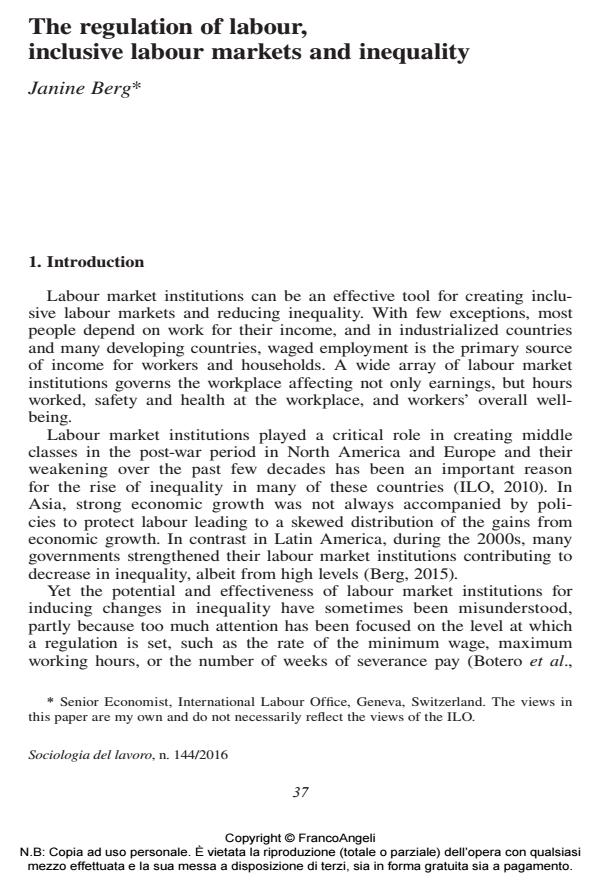The regulation of labour, inclusive labour markets and inequality
Titolo Rivista SOCIOLOGIA DEL LAVORO
Autori/Curatori Janine Berg
Anno di pubblicazione 2016 Fascicolo 2016/144
Lingua Inglese Numero pagine 18 P. 37-54 Dimensione file 137 KB
DOI 10.3280/SL2016-144004
Il DOI è il codice a barre della proprietà intellettuale: per saperne di più
clicca qui
Qui sotto puoi vedere in anteprima la prima pagina di questo articolo.
Se questo articolo ti interessa, lo puoi acquistare (e scaricare in formato pdf) seguendo le facili indicazioni per acquistare il download credit. Acquista Download Credits per scaricare questo Articolo in formato PDF

FrancoAngeli è membro della Publishers International Linking Association, Inc (PILA)associazione indipendente e non profit per facilitare (attraverso i servizi tecnologici implementati da CrossRef.org) l’accesso degli studiosi ai contenuti digitali nelle pubblicazioni professionali e scientifiche
This article advances a simple analytic framework to address issues of the design of labour market regulations as well as raise awareness of how these regulations are continuously affected by transformations in the world of work. While the role of labour market regulations in ensuring more inclusive labour markets and reducing inequality is critical, its influence will depend on aspects besides just the ‘level’ at which protection is set. As a result, policies to strengthen labour market institutions should also consider issues of coverage and compliance when choosing which policies to prioritize and how to design policy reforms.
Questo saggio traccia un semplice quadro analitico allo scopo di affrontare questioni relative alla natura dei sistemi di regolazione del mercato del lavoro e al contempo di accrescere la consapevolezza sul modo in cui essi sono continuamente influenzati dalle trasformazioni del mondo del lavoro. Mentre il ruolo delle regolazioni del mercato del lavoro nel garantire mercati del lavoro più inclusivi e ridurre le disuguaglianze è controverso, la sua influenza dipenderà da aspetti ben oltre il "livell"- al quale è fissata la protezione. Di conseguenza, le politiche per rafforzare le istituzioni del mercato del lavoro dovrebbero anche prendere in considerazione i problemi di copertura e di conformità al momento di scegliere a quali politiche dare la priorità e come progettare riforme politiche.
Parole chiave:Mercato del lavoro, disuguaglianza, regolazione del lavoro
Janine Berg, The regulation of labour, inclusive labour markets and inequality in "SOCIOLOGIA DEL LAVORO " 144/2016, pp 37-54, DOI: 10.3280/SL2016-144004